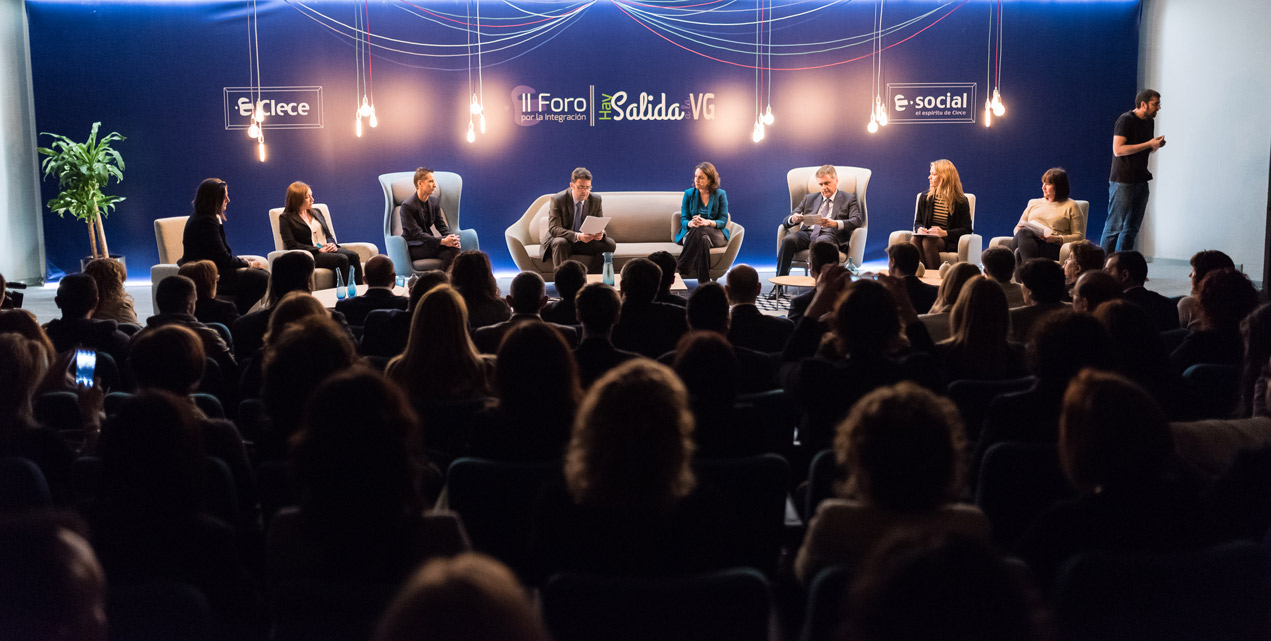
II Forum “Clece for integration”
- In the II Forum-Symposium “Clece for Integration”, the different agents involved in assisting victims of domestic violence debated the main challenges of this work and of collaborating with social integration
- In its commitment to the assimilation of vulnerable groups, the chairman of Clece, Cristóbal Valderas, explained that the greatest contribution that his company can make for these victims is to offer them the chance to work.
- Clece currently employs 143 victims of domestic violence
Valencia 16 April 2015. Clece, a multiservices company, held a debate on the main challenges faced by victims of domestic violence. The “II Clece Forum-Symposium for integration”, under the title “There is a way out of domestic violence”, brought together different social agents involved in assisting this group, who all agreed that the work that fosters the social integration of women who have suffered domestic violence is crucial, as it is a tool which gives them self-esteem, autonomy and independence.
Attendants at the forum had the opportunity to hear first-hand the points of view and experiences of two victims of domestic violence who have been able to gain employment. Lorena and Marta concurred that the work opportunity that Clece provided them was one of the main things that helped them recover from the trauma they suffered. “Your emotional state is the first thing that has to be treated and cared for”, explained Marta, “but work is essential for regaining normality and self-esteem”. For her part, Lorena mentioned the stimulus that finding a job represented for her. “When it seems like all doors are closed”, she said, “work gives you motivation to continue moving forward, and especially, if in this work environment you are recognised as a person with something to contribute”.
In addition to these two women, the symposium (moderated by journalist Julián Giménez), included the participation of Blanca Hernández Oliver, Government Delegate for Domestic Violence; Laura Chorro, General Manager for Family and Women in the Social Well-being department of the Generalitat of Valencia; Cristóbal Valderas, chairman of Clece; Eva Planells, manager of the Valencia Centre for the Protection of Women; and a representative of the Alanna Association, Ana Ferrer.
This is the second time this forum for dialogue has been held “under the social commitment of Clece”, as mentioned by Cristóbal Valderas, Clece chairman, “a social commitment that goes beyond Corporate Social Responsibility and is integrated into an authentic company culture”. In this regard Valderas announced that the company currently employs more than 70,000 people of whom 5,537 come from vulnerable groups and, specifically 143 of them are victims of domestic violence.
The forum started off with a speech by Blanca Hernández, Government Delegate for Domestic Violence, who wished first to highlight the positive aspects of the management of this area by different administrations in recent years. “What has been done in Spain in the fight against domestic violence has no parallel in other countries”, she said. “We are pioneers in many measures and we constantly have other states interested in learning our management model”. However, the Government Delegate also wished to mention the main areas for improvement and the issues of most concern. “Autonomy is one of the main antidotes for domestic violence and work is essential for achieving this independence”. Last, Blanca Hernández warned that, while the greater population fully rejects physical violence, more subtle forms of violence such as control and stalking are still accepted by a significant part of society”.
Laura Chorro, General Manager for Family and Women of the Social Well-being department of the Generalitat of Valencia, indicated how important it is for the private sector to be truly aware of its role, especially in creating true business awareness. “Companies, as well as considering tax breaks for promoting employment of this group”, she said, “should know that they have a responsibility to the environment where they run their activities and they must be aware of the good that they can do by addressing real problems such as providing employment for women who have suffered domestic violence”.
Eva Planells, manager of the Valencia Centre for the Protection of Women, highlighted how the workplace integration of victims of domestic violence is definitive for emotional and psychological recovery. “Without work it is very difficult to get out. Without a job we run the risk that the victim returns to the path already trodden. It is important to understand what autonomy is to them”. Planells added that “being alone and isolated is one of the main barriers that need to be broken down. It is necessary to seek out ‘networks’, assistance that foster integration”.
Social commitment to equal opportunities
The II Forum “Clece for integration” is framed by Clece's social commitment to the workplace integration of victims of domestic violence. Currently its staff includes 143 employees who belong to this group. The company’s effort extends, as well as to other groups and people with disabilities, to unemployed youths, people at risk of social exclusion and victims of terrorism. For this purpose, Clece collaborates with more than 200 associations. Currently, Clece employs more than 70,000 people in Spain and around 6,000 in the Community of Valencia.
